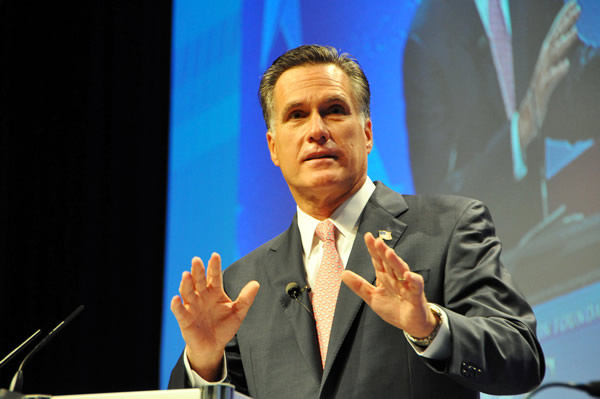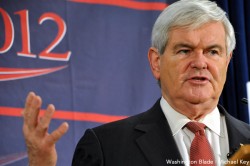National
Fla. gay Republicans hail Romney victory
Log Cabin warns of ‘anti-gay pandering’


Mitt Romney won a decisive victory in Florida this week, as Newt Gingrich appeared to lose momentum. (Blade file photo by MIchael Key)
FORT LAUDERDALE, Fla. — Gay Republicans joined many of their straight counterparts in Florida Tuesday night in congratulating former Massachusetts Gov. Mitt Romney for his decisive victory in the Florida Republican primary.
But R. Clarke Cooper, executive director of the national Log Cabin Republicans, while also congratulating Romney, cautioned him against engaging in “anti-gay pandering or divisive social politics.”
Cooper told the Blade his comment was a reference to statements Romney has made in news media interviews over the past several months in which he appeared to be appealing to conservative voters hostile to gay rights.
Officials with Log Cabin’s chapters in the Miami, Fort Lauderdale and Tampa areas said support for Romney was strong among LGBT Republicans in the state. Romney won by a lopsided margin in a Jan. 28 straw poll of Log Cabin members at an informal gay Republican caucus in Miami.
“I’m pleased that Romney won,” said Andy Eddy, board member of Log Cabin Republicans of Broward County, which includes the city of Fort Lauderdale and the nearby gay enclave Wilton Manors.
“Many of our members support him and believe he has the best chance of beating Obama,” he said.
With 100 percent of the election precincts counted, Romney captured 46 percent of the vote. His closest rival, former House Speaker Newt Gingrich received 32 percent, former Pennsylvania Sen. Rick Santorum received 13 percent, and Texas Congressman Ron Paul received 7 percent.
In Florida’s winner take all primary, Romney captured 50 delegates, giving him a boost going into a series of upcoming primaries and caucuses leading up to Super Tuesday on March 6, when 10 states hold primaries.
“This big win for Gov. Romney makes it all but certain that he will emerge as the nominee of the Republican Party,” said Jimmy LaSalvia, executive director of the gay conservative group GOProud.
“Gov. Romney’s win tonight is particularly pivotal given the size of the state and the importance Florida will have in electing the next president,” he said. “Gov. Romney’s message of economic hope and renewal has clearly resonated with the voters of Florida.
“The truth that neither Barack Obama nor his friends in the liberal media want to discuss is that most Americans, gay or straight, are no better off than they were in 2008 and that is a product of Obama’s failed big government policies,” said LaSalvia, who personally endorsed Romney earlier this month.
Cooper said Log Cabin has a longstanding rule of not endorsing presidential candidates until the time of the Republican National Convention. He said on Tuesday night that the timing of the club’s endorsement vote is strictly “administrative” in nature and has no bearing on the group’s views of Romney.
During the Log Cabin caucus in Miami on Jan. 28, which followed a national Log Cabin board meeting, Cooper and officials with Log Cabin chapters in Florida said the group’s members clearly were leaning toward backing Romney.
Hastings Wyman, editor of Southern Political Report, a newsletter specializing in reporting on politics in the South, characterized as “remarkable” Romney’s dramatic rise in popularity in Florida. He noted that Romney had been trailing Gingrich in the Sunshine State by double digits in the days following Gingrich’s win in the South Carolina primary.
“I think the biggest single factor was money,” said Wyman, in referring to Romney’s lopsided lead over Gingrich and the other three GOP contenders in money raised for his campaign.

Newt Gingrich has vowed to fight on after losing big to Mitt Romney in Florida’s primary this week. (Blade photo by Michael Key)
“I also think Romney did much better in the last two debates in Florida,” Wyman said. “Gingrich just didn’t look as strong. The performance and appearance in the debates by Romney was much better.”
Wyman, who is gay, said it’s hard to predict how Romney will deal with gay issues if he’s elected president.
“I think he would be perfectly comfortable in supporting civil rights for gays,” he said. “But I don’t’ think he would do anything to hurt him politically. I think he would be somewhat better than the others, but he’s not going to do anything to upset his base.”
In his election night statement, Cooper of Log Cabin Republicans cautioned Romney and the other GOP presidential candidates that adopting a “big tent” policy inclusive of gays would be the best tactic for the Republican presidential nominee to defeat Obama in November.
“Our local chapter leaders report that, like Florida voters overall, Log Cabin members in the Sunshine State were drawn to Romney’s business sense and clear plan to return America to prosperity through a strong private sector,” Cooper said.
“Still, there remain serious reservations about recent statements by Romney to so-called ‘pro-family’ groups,” Cooper said. “The real question now is whether Romney can win a majority of Americans, including younger voters, independents and disaffected Democrats,” he said. “Log Cabin Republicans are looking for a candidate who can rebuild the big tent, unite our party and claim a mandate to restore liberty and fiscal responsibility to the United States. Whether that candidate is Romney remains to be seen.”
Jerame Davis, executive director of National Stonewall Democrats, an LGBT group that is backing Obama, said Romney’s win in the Florida primary was due to his ability to “outspend and throw more mud than all of his opponents combined.”
He called Romney “a very unpopular frontrunner” whose support is not as strong as the “not-Romney” wing of the Republican Party.
Although the conservative GOProud and more moderate Log Cabin leaders often disagree over how the LGBT community should interact with the Republican Party, the two groups appeared to be in agreement this week over how to secure LGBT votes for Romney if he wins the nomination for president.
Both LaSalvia and Log Cabin members in Florida said they would stress that LGBT people, like all other voters, care about issues beyond gay rights. While Romney may not be as supportive or outspoken on LGBT issues as Obama, they said they will stress that Romney’s economic policies would help gays where it counts the most, “in their wallets and pocketbooks,” as Log Cabin’s Tampa chapter president Jim Pease said.
“So why do I think gays will do well under Romney?” asked gay Republican activist Jim Driscoll, a former Bush administration appointee to the Presidential Advisory Council on HIV/AIDS. “Romney’s opposition to discrimination against gays in jobs, etc., is genuine. He is not uncomfortable with gay people.”
Gay Democrats argue that unlike Obama, Romney hasn’t taken a position on whether he would support and sign the Employment Non-Discrimination, or ENDA, which would ban job discrimination based on sexual orientation and gender identity.
Attempts by the Blade this week to reach a Romney campaign spokesperson to determine Romney’s position on ENDA and other pending LGBT-related bills in Congress were unsuccessful.
LaSalvia notes that Obama has said he doesn’t support same-sex marriage. Gay Democrats respond by saying Obama has supported virtually all other items on the LGBT rights agenda, including repeal of the Defense of Marriage Act, which bans the federal government from recognizing same-sex marriages performed in states that have legalized them.
In what will likely emerge as the gay Republicans’ key talking point in the fall general election, LaSalvia said gays are not “one-issue” voters.
“Something I say a lot, is especially true when contrasting Obama’s policies with any of the Republican candidates, is that I believe that free market solutions benefit all Americans, but especially gay Americans,” he said.
“Whether it’s Social Security reform that includes private inheritable accounts, free market health care reform that would allow same-sex partners to go on the open market and purchase family plans, or tax reform to make the tax code simpler and fairer, Romney and the other Republican candidates are offering solutions to problems facing all of us that are far better for our country than Obama’s failed policies,” LaSalvia said.
Davis from National Stonewall Democrats said most LGBT voters will dismiss such arguments as “ridiculous.” He said NSD and the Democratic Party has and will continue to show that Obama comes out far ahead on LGBT and non-LGBT issues.
Davis said both Log Cabin and GOProud were downplaying what he called Romney’s most anti-gay stand – his agreement to sign a pledge issued by the anti-gay National Organization for Marriage to support a U.S. constitutional amendment to ban same-sex marriage.
“It’s the height of hypocrisy” that gay Republicans would attempt to excuse Romney’s support for the NOM pledge, Davis said.
“They should be ashamed for excusing any of these GOP swindlers for pandering to these regressive demagogues who seek to not only take away our rights, but persecute us back into the closet,” he said.
A random, unscientific sample of interviews with 14 gay men at Fort Lauderdale’s gay beach on Tuesday appeared to confirm the longstanding leanings of that city’s LGBT community. All 14 said they strongly support the re-election of Barack Obama and would be unlikely to vote for any Republican.
“As a gay man, I won’t vote for any Republican, said Al Adamczyk, a longtime Fort Lauderdale resident. I’m gay and I’m proud of it. Gay Republicans are idiots.”
Daniel Jeffers, a gay Air Force veteran who just moved to Fort Lauderdale with his partner, Jerry Finster, said the two believe Obama has been good on both gay and non-gay issues and would never consider voting for a Republican candidate for president.
“Some gays want him to do more,” said Finster of Obama. “He is doing everything possible. I think independents will vote for him. The Republicans are a joke. Out of a scale of five stars, I have six stars for Obama.”
New York
N.Y. lawmaker vows ‘Pride flag will fly again’ at Stonewall Monument
After a Jan. 21 policy shift, Pride flags were banned at national parks, prompting backlash from Bottcher and LGBTQ advocates.

Hours after news broke that the National Park Service would no longer allow Pride flags to fly at the Stonewall National Monument — the birthplace of the modern LGBTQ rights movement in the United States — the Washington Blade spoke with New York State Sen. Erik Bottcher, who represents the area surrounding the Stonewall Inn and the national monument.
During the interview, Bottcher, who is gay, spoke about the policy change and outlined steps he plans to take in the coming days to push for its reversal.
“This is another act of erasure,” Bottcher told the Blade. “It’s a cowardly attempt to rewrite history and to intimidate our community. This is Stonewall — it’s where we fought back, where we ignited a global movement for equality — and we refuse to go back. We’re not going to accept these acts of erasure.”
The Stonewall Inn became a flashpoint in 1969 after NYPD officers raided the bar, part of a longstanding pattern of police harassment of LGBTQ spaces. The raid sparked days of protest and resistance along Christopher Street, now widely recognized as the catalyst for the modern LGBTQ rights movement.
While the events are often referred to as the “Stonewall Riots,” many activists and historians prefer the term “Stonewall Uprising,” emphasizing that the resistance was a response to systemic oppression rather than senseless violence. LGBTQ patrons and community members fought back — shouting “Gay Power!” and “Liberate Christopher Street!” — as crowds grew and frustration with police abuse boiled over.
Since the uprising, LGBTQ people and allies have gathered annually in June to commemorate Stonewall and to celebrate Pride, honoring the movement that placed LGBTQ voices at the center of the fight for equality.
In June 2016, then President Barack Obama officially designated the space as the Stonewall National Monument, making it the United States’s first national monument designated for an LGBTQ historic site.
Now, nearly 10 years later, President Trump’s appointed NPS acting director Jessica Bowron changed policy on Jan. 21 regarding which flags are allowed to be flown in national parks. Many, including Bottcher, say this is part of a larger targeted and deliberate attempt by the administration to erase LGBTQ history.
“It’s clear they’re making a conscious decision to erase the symbols of our community from a monument to our community’s struggle,” he said. “This is a calculated and premeditated decision, and it could be — and should be — reversed.”
“Let’s be clear,” Bottcher added, “they wish we didn’t exist … But we’re not going anywhere. We refuse to go back into the shadows.”
When asked why it is critical to challenge the policy, Bottcher emphasized the importance of visibility in preserving LGBTQ history.
“This is why it’s so important that we not let this stand,” he said. “Visibility is critical. When people see us, learn about us, and get to know us, that’s how we break down prejudice and stereotypes. We cannot allow them to push us back into the shadows.”
Other LGBTQ leaders and elected officials were quick to condemn the removal of the Pride flag, which had flown since the site’s official designation as a national monument.
New York City Mayor Zohran Mamdani called the decision “outrageous.”
“I am outraged by the removal of the Rainbow Pride Flag from Stonewall National Monument,” Mamdani said in a statement. “New York is the birthplace of the modern LGBTQ+ rights movement, and no act of erasure will ever change or silence that history.”
“Our city has a duty not just to honor this legacy, but to live up to it,” he added. “I will always fight for a New York City that invests in our LGBTQ+ community, defends their dignity, and protects every one of our neighbors — without exception.”
Senate Minority Leader Chuck Schumer also condemned the move.
“The removal of the Pride Rainbow Flag from the Stonewall National Monument is a deeply outrageous action that must be reversed immediately,” Schumer said in a statement to The Advocate. “Stonewall is a landmark because it is the birthplace of the modern LGBTQ rights movement, and symbols of that legacy belong there by both history and principle.”
Cathy Renna, communications director for the National LGBTQ Task Force, said the flag’s removal will not erase the movement it represents.
“They can take down a flag, but they can’t take down our history,” Renna said. “Stonewall is sacred ground rooted in resistance, liberation, and the legacy of trans and queer trailblazers who changed the course of history.”
Human Rights Campaign National Press Secretary Brandon Wolf echoed that sentiment.
“Bad news for the Trump administration: these colors don’t run,” Wolf said. “The Stonewall Inn and Visitors Center are privately owned, their flags are still flying high, and that community is just as queer today as it was yesterday.”
Tyler Hack, executive director of the Christopher Street Project, said the removal was aimed squarely at LGBTQ visibility.
“The Pride flag was removed from Stonewall for one reason: to further erase queer and trans people from public life,” Hack said. “Stonewall marks the moment when queer and trans people fought back and demanded dignity. Our history is not theirs to erase.”
Bottcher closed with a promise to his constituents — and to the broader LGBTQ community — that the Pride flag’s removal would not be permanent.
“We will not be erased. We will not be silenced,” he said. “And the Pride flag will fly again at the birthplace of our movement.”
Florida
Disney’s Gay Days ‘has not been canceled’ despite political challenges
GayDays is moving forward with its planned LGBTQ meet-up

Gay Days in Orlando is preparing for its 2026 gathering though organizers have yet to release full details.
Concerns emerged about the status of the annual meetup of LGBTQ people at Walt Disney World in Orlando, Fla., after social media posts and multiple news outlets reported the event would not take place this year.
In response to inquiries from the Blade, Josh Duke, co-owner of Gay Days, clarified that an update would come this week.
“At this time, I’d like to clarify that Gay Days Orlando has not been canceled,” an email to the Blade said. “We are currently finalizing details regarding our plans for 2026 and will be making an official announcement later this week.”
Earlier this week, Gay Days posted about a pause in their plans for the annual meeting, which quickly gained traction online.
In an official statement on social media, Gay Days organizers cited several factors behind what had initially appeared to be a cancellation of their 2026 event.
“Changes to our host hotel agreement, the loss of key sponsorship support, and broader challenges currently impacting LGBTQIA+ events nationwide made it impossible to deliver the experience our community deserves,” organizers wrote. However, the statement added, “This is a pause — not an ending.”
In a longer message shared with supporters, organizers elaborated on that now-reversed decision.
“Gay Days Family — it is with very heavy hearts that we share Gay Days 2026 will not take place this year. This was an incredibly difficult decision and one that was only made after every possible option was explored.
“Gay Days has always been more than an event — it is community, family, and a place where so many memories are made. While this pause is painful, it also gives us the opportunity to step back, listen, and begin shaping a stronger and reimagined GayDays for the future. Thank you for your continued love, patience, and support. This is not goodbye — it’s a reset, and we look forward to creating the future of GayDays together.”
GayDays, which began in 1991, encourages queer Disney fans to visit the Orlando theme park while wearing red shirts to identify one another. Originally focused on gay men reclaiming the childhood joy often denied due to homophobia, the event has expanded over the years to include LGBTQ+ families on summer vacations and queer couples honeymooning in the Magic Kingdom.
Disney made history in 2019 by holding its first-ever official Pride event at its European park, Disneyland Paris. In 2023, Disneyland California hosted the first U.S. official Pride event.
Concerns about the potential cancellation had arisen amid broader challenges affecting LGBTQ events nationwide. These include changes in hotel agreements, sponsorship support, and Florida’s increasingly restrictive anti-LGBTQ policies under Gov. Ron DeSantis. Florida currently has an equality score of -3.00 out of 49 from the Movement Advancement Project, which evaluates states based on policies affecting relationship and parental recognition, nondiscrimination, religious exemptions, LGBTQ youth, healthcare, criminal justice, and transgender identity documentation.
Recent legislation in Florida has included prohibitions on hormone replacement therapy for transgender minors, restrictions on adult access to treatment, bans on drag performances for those under 18, bathroom bans for transgender people in state buildings, and expansion of the Parental Rights in Education Act, commonly called the “Don’t Say Gay” law. These measures limit public school instruction or discussion about sexual orientation and gender identity.
Gay Days Anaheim is scheduled to take place at Disneyland Resort in September.
Disney has also maintained a focus on Pride, reporting in 2022 that proceeds from Pride merchandise benefited numerous LGBTQ organizations, including GLSEN, PFLAG, The Trevor Project, Zebra Coalition, the Los Angeles LGBT Center, the LGBT Center Orange County, the San Francisco LGBT Center, and the Ali Forney Center. Pride merchandise sold internationally supports local LGBTQ organizations in those regions.
More details about this event are expected to be released on Friday.
New York
Pride flag removed from Stonewall Monument as Trump targets LGBTQ landmarks
The new NPS policy targets Pride flags amid consistent efforts from the Trump administration to minimize LGBTQ history.

A rainbow Pride flag flying at the Stonewall National Monument in New York was removed at the direction of Trump administration officials at the National Park Service, according to a source familiar with the matter who spoke to the Blade on condition of anonymity.
The source said the move had been in the works for weeks and is part of ongoing efforts by the Trump-Vance administration to erase LGBTQ identity from federally controlled landmarks.
In response to the Blade’s request for information about the new flag policy, the National Park Service provided the following statement:
“Current Department of the Interior policy provides that the National Park Service may only fly the U.S. flag, Department of the Interior flags, and the Prisoner of War/Missing in Action flag on flagpoles and public display points. The policy allows limited exceptions, permitting non-agency flags when they serve an official purpose. These include historical context or reenactments, current military branch flags, flags of federally recognized tribal nations affiliated with a park, flags at sites co-managed with other federal, state, or municipal partners, flags required for international park designations, and flags displayed under agreements with U.S. Citizenship and Immigration Services for Naturalization ceremonies.”
The statement also included official guidance on the display of non-agency flags issued by Trump-appointed National Park Service Director Jessica Bowron.
The Blade reached out to other organizations to confirm the status of the Pride flag last week, including the Stonewall National Monument Visitor Center, the NYC Landmarks Preservation Commission, and the National Parks Conservation Association. None were able to provide details about whether the flag was still flying at that time but it has since been removed.
This action aligns with other moves targeting and erasing LGBTQ history. In September, the Blade reported that three organizations originally slated to receive more than $1.25 million from the National Park Service’s Underrepresented Communities Grant Program would no longer receive funding: In Washington, D.C., the Preservation League had been awarded $75,000 to document LGBTQ+ historic resources. In Providence, R.I., the Preservation Society was slated for $74,692 to conduct an LGBTQ+ survey and prepare a National Register nomination. And in New York, the Fund for the City of New York, Inc., had been awarded $32,000 to nominate the residence of Bayard Rustin — the iconic civil rights and LGBTQ activist — as a National Historic Landmark.



















